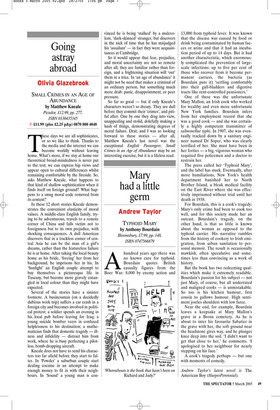Going astray abroad
Olivia Glazebrook
SMALL CRIMES IN AN AGE OF ABUNDANCE by Matthew Kneale Picador, £12.99, pp. 277, ISBN 0330435345 ✆ £11.99 (plus £2.25 p&p) 0870 800 4848 These days we are all sophisticates, or so we like to think. Thanks to the media and the internet we can become worldly without leaving home. What’s more, if we stay at home our theoretical broad-mindedness is never put to the test; we can express hip views and appear open to cultural differences whilst remaining comfortable by the fireside. So, asks Matthew Kneale, what happens to that kind of shallow sophistication when it finds itself on foreign ground? What happens to a smug moral code removed from its context?
In these 12 short stories Kneale demonstrates the convenient elasticity of moral values. A middle-class English family, trying to be adventurous, travels to a remote corner of China and falls victim not to foreignness but to its own prejudice, with shocking consequences. A dull American discovers that in a trackless corner of central Asia he can be the man of a girl’s dreams, rather than the featureless failure he is at home. After taking the local beauty home as his bride, ‘freeing’ her from her background, he imprisons her in his. In ‘Sunlight’ an English couple attempt to buy themselves a picturesque life in Tuscany, but become more gravely entangled in local colour than they might have expected.
Several of the stories have a sinister footnote. A businessman (on a decidedly dubious work trip) suffers a car crash in a foreign city and becomes involved in political protest; a soldier spends an evening in his local pub before leaving for Iraq; a young suicide bomber veers in confused helplessness to his destination; a mathematician finds that domestic tragedy — illness and infidelity — distract him from work, where he is busy perfecting a pilotless, bomb-dropping aircraft.
Kneale does not have to send his characters too far afield before they start to falter. In ‘Powder’ a suburban couple start dealing cocaine in an attempt to make enough money to fit in with their neighbours. In ‘Sound’ a young man is con vinced he is being ‘stalked’ by a malevolent, ‘dark-skinned’ stranger, but discovers in the nick of time that he has misjudged his ‘assailant’ — in fact they were acquaintances at Cambridge.
So it would appear that fear, prejudice, and moral uncertainty are not so remote after all; they are familiar rather than foreign, and a frightening situation will ‘out’ them in a trice. In ‘an age of abundance’ it might not be need that makes a criminal of an ordinary person, but something much more drab: panic, disappointment, or peer pressure.
So far so good — but if only Kneale’s characters weren’t so dreary. They are dull before they commit their ‘crimes’, and pitiful after. One by one they drag into view, unappealing and stolid, dolefully making a hash of things, demonstrating degrees of moral failure. Drat; and I was so looking forward to these stories — after all, Matthew Kneale’s last novel was the exceptional English Passengers. Small Crimes in an Age of Abundance may be an interesting exercise, but it is a lifeless read.


























































 Previous page
Previous page